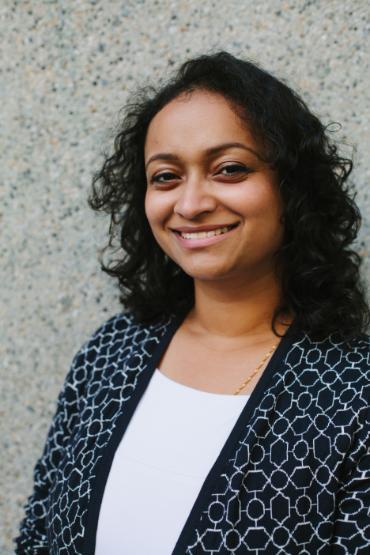Riddhi Mukhopadhyay ’09 seeks dignity, justice for victims of gender-based violence
This story originally appeared in Lawyer, Spring 2023.
 Two things fuel Riddhi Mukhopadhyay ’09 in her work as an attorney for sexual and domestic violence survivors, and both seem endless in supply — outrage and optimism.
Two things fuel Riddhi Mukhopadhyay ’09 in her work as an attorney for sexual and domestic violence survivors, and both seem endless in supply — outrage and optimism.
The outrage comes from the violence she confronts every day, perpetrated not just by abusers but also by a system that makes it challenging for survivors to find justice and safety, their stories so often dismissed or belittled. The optimism comes from her tireless colleagues and the clients themselves.
Countless people have persevered in telling their stories with her center’s support. One former client has gone on to advocate for important state and national legislation to protect survivors. Many have channeled the pain of their experiences into beautiful art or music. Several have gone on to graduate high school or college, some pursuing law school to also fight for victims.
“It keeps me going,” Mukhopadhyay said. “I really do believe we can have a community and a justice system that is trauma-informed and that centers survivors. But we’re not there yet, and I want to push as much as I can to make it happen.”
Since the COVID-19 pandemic hit, and rates of domestic and sexual violence increased, she’s been especially successful at advocating for legislation that streamlines the process for getting civil protection orders and requires training for judges who hear these cases.
Mukhopadhyay is the executive director of the Seattle-based Sexual Violence Law Center (SVLC), which protects the privacy, safety, and legal rights of survivors throughout Washington state. In 2022, her work was recognized with two prestigious awards — the Sharon L. Corbitt Award from the American Bar Association Commission on Domestic & Sexual Violence, and the Norm Maleng Leadership Award from the Washington State Bar Association. She had previously received the Seattle Women’s Commission’s Jeanette Williams Award and Senator Patty Murray’s Golden Tennis Shoe Award for her advocacy on behalf of survivors.
The awards validate SVLC’s holistic approach to helping clients, Mukhopadhyay says, explaining that it’s a distinct departure from the siloed services traditional legal aid offers. A survivor on average experiences 18-19 legal issues as a consequence of their abuse, but SVLC clients don’t have to work with different lawyers, sharing their trauma each time, in order to have their multiple legal needs met.
“We'll take the immigration case, the housing case, employment, Title IX, protection order, and anything else that’s an emergency legal issue connected to the domestic violence or the sexual assault,” she said. “When I started at SVLC 10 years ago, people didn’t think the holistic model would be sustainable.”
With requests for assistance increasing each year, the center’s now 14-person team served around 900 survivors last year with either direct representation or consultations via a statewide hotline. Those clients — who’ve survived sexual assault, trafficking, abuse, stalking, or harassment — inform Mukhopadhyay’s priorities as an advocate for legislative change.
I need to know that I can improve the system through legislative and policy work, while also making sure day-to-day people experience some relief through representation,” she said. “If this work is going to make a long-term impact, I have to do both.”
Sara Mooney ‘09, pro bono counsel at SVLC, remembers Mukhopadhyay as a talented, driven, and compassionate classmate in law school. These are among the qualities that help her succeed in her mission to protect her clients’ dignity.
“She does not tolerate intimidation or aggression from opposing parties or even courts,” Mooney said, adding that she makes sure survivors are at the table when discussing policies or legislation. “Her dedication is sincere, impactful, and limitless.”
Mukhopadhyay said she’s humbled by the recent awards, pointing out that she’s part of a much larger cohort of social justice lawyers who often work without recognition. It’s a community of colleagues she found at Seattle University School of Law, where the draw to its social justice mission was strong enough for her to leave her family back in Texas and move to the West Coast.
Law was an unlikely career choice; her immigrant parents expected a career in medicine or science. And the only lawyers she had seen were white men on TV or the unscrupulous immigration attorneys who took advantage of her family when they moved to the U.S. from India while she was in middle school. That changed when she volunteered while at Duke University as an interpreter for immigrant domestic violence survivors (she speaks Bengali, Hindi, and Spanish) and saw firsthand the positive impact of having legal assistance.
“Law school gave me the tools to engage in the kind of advocacy our communities deserved,” she said. “I wanted to do more than just hold their hands. I want their voices respected. I want their access to justice to be meaningful.”
